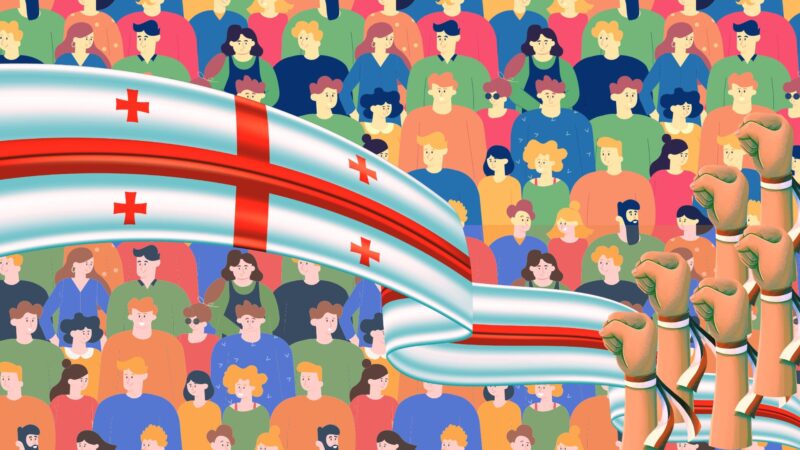
Thousands of Georgians have gathered on Rustaveli Avenue in Tbilisi every night since November 2024 without any single organization coordinating them. The pro-EU protests represent something new in Georgian civic life — a leaderless, self-organized movement, driven largely by young people using social media.
Political parties and non-governmental organizations (NGOs) share information and organize events, but they cannot claim ownership of the demonstrations. Yet, polls show that while most Georgians support European Union integration, protesters are mainly young, educated Tbilisi residents.
This gap reveals a deeper puzzle about Georgian society: why do people who show remarkable informal civic engagement remain largely absent from formal democratic organizing?
Recent research reveals surprising patterns in Georgian civic behavior. Seventy-four percent of Georgians have helped friends with household chores, 69 percent have assisted strangers in roadside emergencies, and 52 percent have donated to charity.
Most remarkably, 74 percent express willingness to participate in campaigns about unemployment or healthcare. Yet, only eight percent have ever had contact with the NGOs that organize such campaigns.
This disconnect reflects an institutional mismatch. Georgians possess strong social capital — networks of trust and cooperation that enable collective action. But formal civil society organizations have struggled to connect with how Georgians traditionally cooperate — through informal networks and neighborhood support.
For instance, people provide mutual assistance during illness or financial problems, or organize community responses to local challenges like environmental issues and elderly care during emergencies. Such relationships are reciprocal, voluntary, and based on personal trust rather than formal structures. The problem stems partly from Georgia's historical trajectory and how civil society developed after independence.
Early Georgian civic life looked different. Writer Ilia Chavchavadze helped establish the Society for the Spreading of Literacy among Georgians in 1879. The organization built schools, bookshops and libraries across the country. Many consider this Georgia's first civic organization.
This grassroots approach enabled mass participation. The Georgian Democratic Republic (1918-1921) saw the Social Democratic Party of Georgia win 81.5 percent of the popular vote. Parliament included multiple parties representing different constituencies — Socialist-Federalists focused on peasant issues, nationalist groups and regional movements. Historian Ronald sung noted there was real “support among all classes of Georgian people.”
After independence in 1991, Western donors channeled resources through professional NGOs rather than mass organizations. Georgia's NGO sector grew rapidly, from zero in 1992 to thousands of organizations within a decade. While some organizations addressed citizens’ immediate needs, democracy and human rights work was more visible, and NGOs were soon associated in the public mind with these abstract concepts rather than everyday concerns like healthcare access, employment or local infrastructure needs. Critics called this “genetically engineered civil society” — professionally effective, but detached from broader social networks.
Some movements have connected formal organizing with Georgian social patterns. The 2003 Rose Revolution succeeded because it linked elite political opposition with popular anger about corruption and electoral fraud. When people perceived fundamental unfairness, they extended trust beyond their immediate circles.
The Georgian Young Lawyers’ Association (GYLA) demonstrates how professional organizations can reach ordinary citizens. For more than 30 years, the GYLA has provided over 1.3 million instances of free legal aid. The organization currently serves about 50,000 people annually, through offices in Tbilisi and seven other towns. Its success is built on addressing concrete problems affecting Georgians, across class and regional divides.
A digital platform called Daitove recently mobilized 250,000 people to provide food, funds and transportation for protesters. The platform worked through peer-to-peer networks rather than centralized coordination.
Two key structural factors, based on the evidence above, prevent informal civic energy from becoming sustained democratic participation.
First, donor requirements often favor formal organizational structures over the informal networks where Georgians cooperate effectively. Organizations need boards, strategic plans and reporting systems, all of which can undermine natural collaboration patterns by forcing people into rigid hierarchies that don't match how they actually work together.
Second, political polarization hardens group boundaries, making it difficult for organizations to maintain the cross-cutting relationships that enable broader coalitions.
Georgia's drift toward authoritarianism makes understanding these dynamics urgent. The current government restricts organizing space through laws like the controversial “foreign agents” legislation, but bridging informal civic energy with formal democratic institutions will remain crucial for any future democratic opening. This means that finding ways to create organizations that work with Georgia's natural patterns of cooperation — rather than against them — might be needed for any democratic opening.
The Georgian experience offers lessons for democracies worldwide: the challenge isn't as much about creating more professional NGOs as it is about building institutions that align with how people develop trust and solve problems together.
The protesters on Rustaveli Avenue oppose specific legislation, but they also express a deeper desire for authentic political participation. Whether Georgia's institutions can respond to this call may determine the country's democratic future — because the question isn't whether Georgians care about democracy — it's whether democratic institutions can learn to work the way Georgians do.
https://globalvoices.org/2025/08/14/beyond-the-protests-understanding-georgias-civic-paradox/